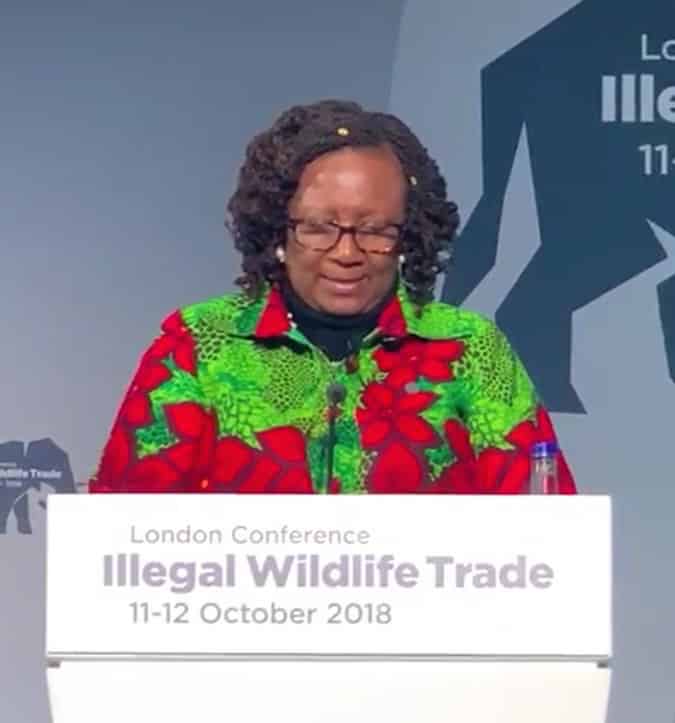By Byron Mutingwende
To ensure ecologically functional landscapes, there is need to facilitate the adoption of policies that promote conservation beyond boundaries of gazetted protected areas, Priscah Mupfumira, the minister of environment, tourism and hospitality industry has said.
She made the remarks at the London Conference on Illegal Wildlife Trade held from 11 to 12 October 2018 in Britain. Honourable Mupfumira said 13% of Zimbabwe’s land area is under the protected area category.
“There are six Trans-frontier Conservation Areas (TFCAs) initiatives that the government is current pursuing in collaboration with neighbouring countries namely Kavango-Zambezi TFCA (Angola, Botswana, Namibia, Zambia ad Zimbabwe) which is the largest in the world, Great Limpopo TFCA(Mozambique, South Africa and Zimbabwe), Greater Mapungubwe TFCA(Botswana, South Africa and Zimbabwe), Chimanimani TFCA (Mozambique and Zimbabwe), Lower Zambezi Mana Pools TFCA (Zambia and Zimbabwe) and ZIMOZA TFCA (Zambia, Mozambique and Zimbabwe) at various stages of development.
“The TFCA initiatives, together with our signature Communal Areas Management Programme for Indigenous Resources (CAMPFIRE), increases the area where wildlife conservation is recognised as a viable land-use option in Zimbabwe to 26%. In such multiple land-use areas, identifying, mapping and securing wildlife movement corridors straddling across boundaries is key to species survival, creating more space for growing populations of our endangered and threatened wildlife that are usual targets for illegal trade and trafficking by criminal syndicates,” Mupfumira said.
Concerted efforts for international cooperation to protect wildlife movement corridors and dispersal areas remains a priority at both country and at transboundary level.
“We may also need to recognise that “Green Corridors” do not have protection status under the laws governing wildlife conservation and perhaps this is something our governments should seriously consider. The competing land-uses and limited resources justify the need to put in place appropriate tools for the protection of Green Corridors. The objectives of the SADC TFCA programme is in tandem with our obligations under various international treaties, particularly the Convention on the Conservation of Migratory Species (CMS) and the Convention on International trade in Endangered Wild Species of Flora and Fauna (CITES).”
Mupfumira called for the promotion of exchange programmes to facilitate cross-pollination of ideas and lessons on implementing the United Nations Convention against Transnational Organised Crime (UNTOC) which Zimbabwe ratified on the 25th of August 1980.
She highlighted that some of the wildlife species cherished elsewhere are also regarded as pests in other areas where people are living with wildlife in abundance, resulting in human wildlife conflicts which need careful management and mitigation measures.
In that regard, communities should play a role in the conservation matrix as well as combatting illegal wildlife crime and trafficking. Mupfumira said local communities should remain part of the intelligence network at all levels (from local to global) to implement effective and adequate law enforcement measures.
Capacity building to support state security agents in scaling-up efforts to curb cybercrime at local, regional and global level is also very important. Zimbabwe and other developing countries need technology transfer support to accelerate uptake and utilisation of online illegal wildlife crime knowledge management portals for timeous sharing of relevant and critical information.






